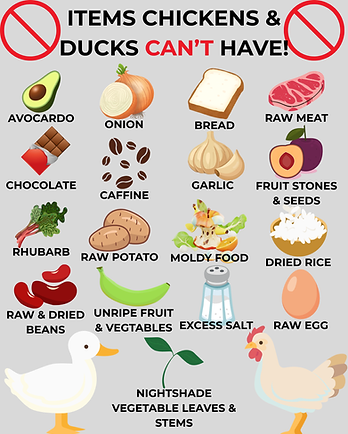Items your pets can't have
Feeding our pets the right food is crucial for their health and well-being. Many pet owners may not realize that certain human foods can be harmful or even toxic to animals. It's important to educate ourselves on what constitutes a balanced diet for our pets and to avoid giving inappropriate snacks that could lead to serious health issues. By providing the appropriate nutrition, we ensure our friends live happy and healthy lives.
This article contains information for dogs and cats, horses, chickens and ducks.

This image displays items that dogs and cats should steer clear of.
Chocolate is extremely toxic, even small quantities.
Cooked bones can splinter and lead to injuries.
Raw bread dough can expand during digestion, causing discomfort.
Grapes and raisins pose a risk of kidney failure.
Artificial sweetener xylitol can lead to dangerously low blood levels, collapse, and potentially death.
Onions, garlic, chives, and leeks contain a harmful toxin (organosulphoxides).
Avocado has a toxin (persin) that is harmful.
Macadamia nuts can be toxic, even a small amount.
Caffeine can damage various organs including the kidneys, liver, heart, and lungs, and can vomiting, diarrhoea, high blood pressure, and tremors.
Alcohol is present in many household products, such as drinks, hand sanitisers, and antifreeze. It is absorbed rapidly and can cause harm in as little as 30 minutes, possibly leading to fatal outcomes.
Most pets are lactose intolerant so should stay away from dairy products.

This image outlines items that horses should steer clear of.
After mowing, grass clippings begin to ferment and decompose by the time they reach a horse, they are fermented and may lead to colic.
Feeding horses any type of meat is never acceptable.
Horses are lactose intolerant and can't digest dairy even small quantities can result in diarrhoea, while larger amounts may cause colic.
Bread can create a blockage your horse's digestive system, potentially resulting in colic.
Onions, leeks, chives, and shallots are toxic to horses, as they can harm red blood cells and lead to anemia. However, small amounts of garlic safe when given as part of a specially formulated feed supplement.
Broccoli, cauliflower, Brussels sprouts can produce intestinal gas, which may contribute to colic.

This image is a list of items that chickens and ducks should avoid.
Feeding meat can have the risk of salmonella and harmful bacteria.
Raw eggs can encourage them to eat their own eggs, creating a challenging habit to break instead, offer them cooked eggs.
Bread can be harmful and may cause health issues.
Fruits with seeds, like apples and pears, and those with pits, as cherries, plums, peaches, and apricots, can be fatal if not properly prepared by removing seeds and pits.
Rhubarb contains anthraquinones, which may act as a laxative.
Onions and garlic have sulfur compounds that can irritate a bird's mouth, esophagus, or crop, potentially causing ulcers and altering the flavor of their eggs.
Raw potatoes and their peels contain a toxin called alkaloid solanine, which is harmful to birds.
Raw or dried beans contain phytohaemagglutinin, a toxin that can be deadly to birds unless cooked.
Salt can disrupt a bird's electrolyte and fluid balance, leading to excessively wet feces, thirst, dehydration, kidney failure, and even death.
Mold on soft fruits, nuts, corn, and apples produces toxins that are linked to liver cancer.
Green potatoes and green tomatoes contain solanin and chaconine, which can cause drowsiness, paralysis, and ultimately, death.

